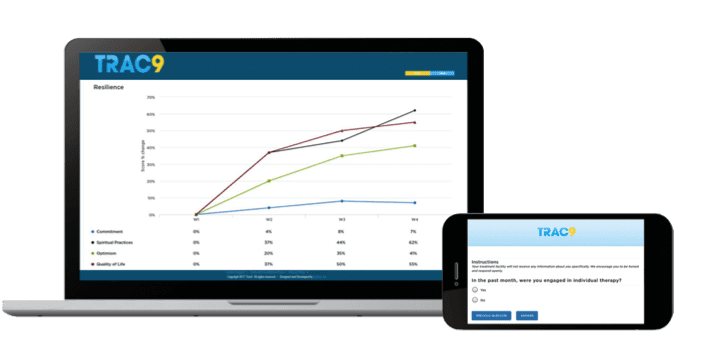Trac9
Enhance Treatment Effectiveness & Clinical Outcomes
What is Trac9?
Trac9 is a software tool used in addiction treatment and mental health programs to assess and monitor client progress. It focuses on measuring factors associated with long-term recovery success, going beyond just substance use itself.
Enhancing Outcomes with Data
COMMITMENT | OPTIMISM | SPIRITUALITY | QUALITY OF LIFE | ANXIETY | DEPRESSION | STRESS | VERBAL CRAVING | VISUAL CRAVING
- Real-time monitoring of the client’s progress
- Instant alerts to the treatment team if symptoms increase
- Clinical Director monitors quality of care for all clients
- Monitoring of clients satisfaction with treatment
- Monitoring of symptoms and protective factors that promote recovery
- 12 Monthly follow-ups after client discharges from treatment
- Real-time monitoring for each of our locations
- Computer analysis that allows for identification of high risk patients


Standardized assessment battery for substance use disorder treatment programs: clinical monitoring, outcomes, supervision, and success forecasting
After recognizing the difficulty that most treatment facilities have with creating an effective post-treatment follow-up program, Trac9 was deployed by our program to offer an automated assessment plan.
Through a secure web app, Trac9 uses a series of standardized assessments to identify changes in depression, anxiety, stress, visual response to cravings, verbal response to cravings, spirituality, commitment to sobriety, optimism, and quality of life. The assessments are collected on an as-needed basis, typically weekly, and track the user’s responses to predict the likelihood of a relapse. The results are charted in an easy-to-read graph that shows the client’s progress or the need for additional recovery work.
When changes are noted, the client’s clinician is automatically notified that follow-up is needed.
Trac9 creates a better way for facilities to stay in touch with their clients long after discharge. This ongoing relationship creates accountability for both the client and the treatment center. By measuring the success of their clients or the need for additional care, facilities can develop best practice tools that lead to measurable, positive outcomes.
Trac9 Developers
Dr. Kitty Harris Wilkes serves as President of NLW Partners, which is dedicated to consulting, education, science, and research for addiction recovery. She is a noted author and public speaker, and presents at national conferences, workshops, and seminars on topics including adolescence; collegiate addiction and recovery; and communication, civility, and leadership. She served for twelve years as the Director of the Center for the Study of Addiction and Recovery (CSAR) at Texas Tech University. Under her leadership, the CSAR gained national attention, appearing in the Wall Street Journal, on the NBC Today Show, and on CNN, and being featured in The Chronicle of Higher Education, Inside Higher Ed, and The New York Times. Dr. Harris is the author of Women and Recovery-Finding Hope, published by John Wiley & Sons, Inc. and co-editor of Substance Abuse Recovery in College, published by Springer.
Jared P. Dempsey, Ph.D., serves as Chief Scientist at NLW Partners. Dr. Dempsey is actively involved in neurological and physiological research in addiction. Recent publications include preliminary evidence for a biological marker of addiction recovery, non-conscious emotional response to drug stimuli, and the influence of social anxiety on addiction treatment. Dr. Dempsey has also served as an expert reviewer for the Journal of Motivation and Emotion, Psychopharmacology, Journal of Psychopathology and Behavioral Assessment, American Journal on Addictions, Addiction, Psychiatry Research, European Psychiatry, Nicotine and Tobacco Research, and the Journal of Studies on Alcohol and Drugs. Dr. Dempsey was also actively involved in the development of a comprehensive symptom tracking and outcome data collection tool for addiction treatment, Trac9.
What it Does Trac9 do?
- Tracks nine key factors: These include depression, anxiety, stress, craving response, commitment to sobriety, spirituality, optimism, quality of life, and resilience.
- Uses standardized assessments: These assessments are scientifically validated and ensure consistent and reliable data collection.
- Provides visual reports: Data is presented in easy-to-understand graphs and charts, tracking progress over time.
- Identifies potential issues: Early warning signs of setbacks or areas needing more focus are readily visible.
- Informs treatment decisions: Clinicians can use Trac9 data to personalize treatment plans and interventions for each client.
How does Trac9 Benefit my Recovery Efforts?
- Personalized care: Treatment is tailored to individual needs and progress, based on their specific data.
- Increased motivation: Seeing progress visually can be motivating and reinforce efforts in recovery.
- Early intervention: Potential issues are identified early, allowing for prompt adjustments in treatment.
- Improved outcomes: Research suggests programs using Trac9 see better client outcomes in terms of long-term recovery.
